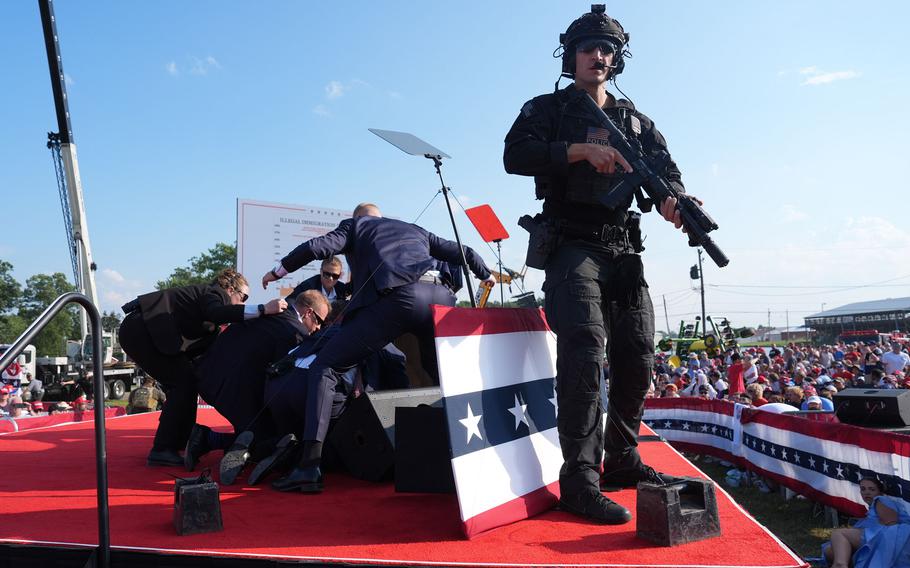
Secret Service agents cover Donald Trump during a campaign rally in Butler, Pennsylvania, on July 13. Trump ducked and was taken offstage after a gunman opened fire during the rally. (Jabin Botsford/The Washington Post)
The July assassination attempt against then-candidate Donald Trump should not have happened, the bipartisan House task force investigating the attack wrote in its final report — a 180-page document released Tuesday that did not offer significant new findings.
The panel’s newly released findings confirmed its previously publicized conclusions, detailing how the attack followed a convergence of failures before and during the Butler, Pennsylvania, rally where a gunman opened fire, killing a spectator and injuring Trump and two others. The report — drawn from 46 witness interviews, hearings, briefings from federal agencies and a site visit — indicated that the incident was preventable but that there was not “a singular moment or decision” of failure.
Instead, multiple failures aligned to create conditions that allowed a 20-year-old gunman to open fire from a roof adjacent to Trump’s rally venue. The biggest failures of the day, including that the shooter was spotted by law enforcement but communication breakdowns thwarted attempts to track him, have been previously reported.
A preliminary report from a Senate committee investigating the shooting and an internal Secret Service review have also found multiple security failures.
The House task force, which was led by Rep. Mike Kelly (R-Pa.), made more than three dozen recommendations for the federal government, including changes the Secret Service should make related to training, leadership and agency resources. The task force recommended that Congress reevaluate the Secret Service’s placement within the Department of Homeland Security and review the agency’s investigative role.
The Secret Service has already implemented changes in response to the attempted assassination, acting director Ronald L. Rowe Jr. said at the task force’s final hearing last week. Rowe said he took accountability for “our failure” and detailed various efforts to address the problems that factored into the July 13 attack.
The House report also addressed the second would-be attack on Trump in September, when the former president was golfing at his course in West Palm Beach, Florida. The Secret Service, which thwarted the potential attack, had previously identified the golf course’s perimeter as a favorable position for snipers and the site had “critical vulnerabilities,” the report said.
In a partially redacted section of the report, the task forced noted “missteps,” adding that the Secret Service had been notified at 2:30 a.m. of Trump’s plans to golf that day, and Trump then arrived to the course about an hour early.
The July 13 assassination attempt in Pennsylvania occurred a few minutes into Trump’s speech there, and Americans watching the rally live on TV and online saw it unfold in real time. Trump, bleeding from his ear, was rushed offstage after raising his fist in the air and shouting “Fight” three times. Two attendees were critically injured, and 50-year-old Corey Comperatore was killed.
The report said one Secret Service assistant special agent told the committee that Trump instructed the agents trying to move him to safety to wait before he raised his fist, creating an image that Trump, allies and supporters quickly adopted as a show of his strength. The agent said he had never been trained for a scenario in which someone attempted to stay on the scene after an attack.
The task force noted the failure to secure the building adjacent to the rally site where the gunman was, even though it was a “recognized high-risk area”; a lack of guidance from the Secret Service to state and local law enforcement officers about who was responsible for the area; and a lack of personnel that resulted in gaps in police coverage.
Technological issues also played a role, along with what the task force described as communication breakdowns, according to the report. The report also pointed to leadership and training issues, including a lack of experience from the Secret Service personnel who were in charge of planning for the event.
The attempted assassination became a regular talking point for Trump on the campaign trail, and he and his allies often said that God had saved his life. He returned to the Butler site for a large rally in October.
Jacqueline Alemany contributed to this report.